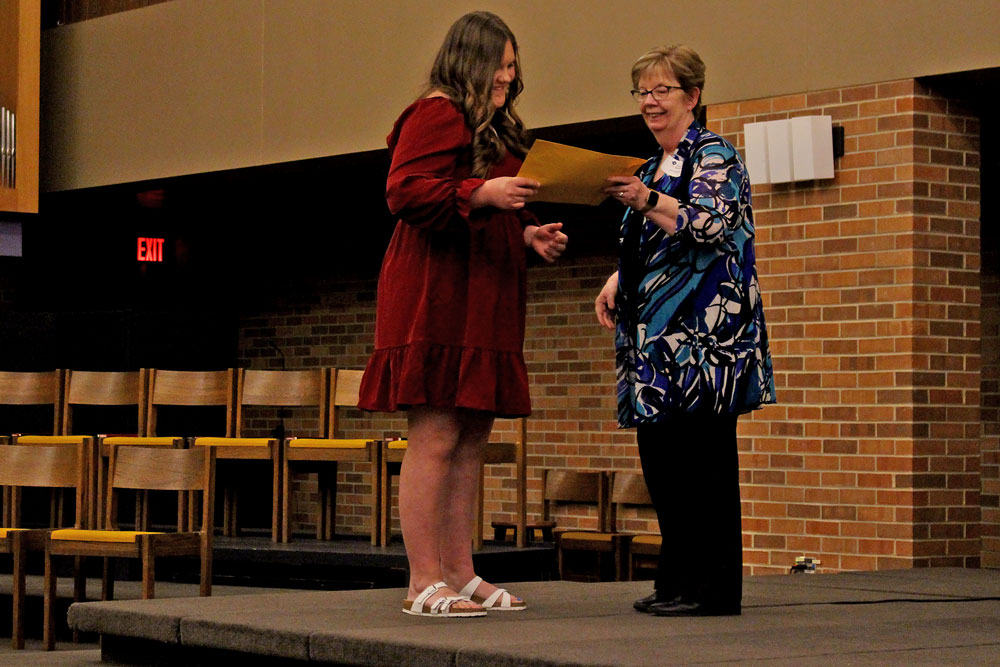Telecom Utility Board takes major steps forward in broadband project
By Kelly Terpstra, kterpstra@charlescitypress.com
As each vote was cast Tuesday evening in the City Hall council chambers, the Charles City Telecommunications Utility Board made more progress toward its goal of creating a community fiber-to-the-home broadband system.
“This is exciting,” said City Administrator Steve Diers, who has been an integral player in the 14-year effort that would allow the city to offer high-speed internet, video/TV and telephone to residents and businesses of Charles City.
One of the major hurdles crossed Tuesday was the purchase of property at 813 N. Main St., the current location of the City Tap tavern.
The property will be used for the location of the data center and will also store the head-end equipment. The nerve center serves as the transmitting station that sends out signals in what will be a redundant loop that will stretch fiber to an area near Mason City and will hook up with Cedar Falls, Waverly and New Hampton.
The owners of the property, Terry and Heidi Huxsol, have agreed to sell the property to the board for $190,000. The property can be closed on, on or before April 1.
According to Floyd County tax records, the property had an assessed valuation of $174,550 in 2019
The buyer will pay $2,500 earnest money and will be put into a Parson Real Estate Trust Account after signing off on the offer.
“We do have a list of items that the owner wishes to keep, which is nothing that is pertinent to our needs,” said Diers. Some of those items include tables, chairs, pool tables, coolers and kitchen equipment that the bar uses in its business.
Diers said he thought it was best the board voted to approve purchase of the property rather than the City Council. The city will still hold the deed to the property.
“There’s going to be a healthy amount of demolition involved and remodeling in there. That was going to be the case for pretty much anything we looked at for the most part,” said Diers.
The property will be purchased after the board votes on a $1 million loan agreement with the city. The board set a public hearing date of Tuesday, Feb. 11, at 4 p.m. to invite public comments before action is taken on that agreement.
“This is what sets up basically your upfront interim financing that you’re going to be able to obtain from the city more or less,” said Diers. “The funding agreement that will be put in place will be there to provide funding to cover the purchase of this property.”
With the headquarters site known, the design and engineering phase of the project can be finalized and entered into the business plan.
Erik Lampland with Lookout Point Communications, along with NewCom Technologies, are putting the finishing touches on the design work.
Lampland said the business plan is about three weeks to a month from being finished. Part of that plan includes approving pricing on the different products the utility board wants to sell as part of the triple-play package. That decision could be made at the next board of trustees meeting in February.
An intergovernmental agreement, known as a 28E agreement, with all the entities involved in the continuous ring that will provide service for customers also needs to be agreed upon and approved by the board.
Lampland said his firm could receive construction bids as early as May. The project could break ground and begin laying fiber after a bid is awarded by the board. The project has been estimated to take up to 18 months to reach all potential customers within the city limits, but some people could begin receiving services sooner than that.
“We shouldn’t be too far off of our original hope of building in the spring (2021),” said Lampland.
Diers said he is anxious to hire a general manager for the $15 million project. He said advertising and interviewing for the position could take a couple of months.
“That’s something that we need to be moving on fairly soon to get that position filled,” he added.
In the meantime, the board will utilize the expertise of two consultants that have each worked on other broadband projects in the state.
The board approved agreements with consultants Curtis Dean of SmartSource and Todd Kielkopf of KAS (Kielkopf Advisory Services).
Dean and Kielkopf’s rate is $120 per hour and the work they do to help with the broadband project shall not exceed 50 hours in a month. Dean and Kielkopf’s contract runs from Jan. 20, 2020, until Dece. 31, 2020.
“I will do as much or little as you want as the time comes. The intention is to not be needed — that everything is running smooth,” said Kielkopf.
The board also approved an amendment to the agreement with interim network engineer Ben Stineman of Fuse Technic. Two weeks ago he was hired for one year ending Dec. 31, 2020, with compensation of $175 per hour, not to exceed 40 billed hours per month.
The board also voted to approve a retainer agreement with the law firm Dorsey and Whitney for legal services.
The board voted Cheryl Erb as board chairwoman, Jeff Marty as vice chairman and Trudy O’Donnell as secretary.
The board of trustees will have oversight of the broadband operation and be responsible for the possible issuing of revenue bonds that could help pay for the project.
The cost incurred into the third year of the project lists capital expenditures of $13.2 million and bond requirement of $12 million. The cost of the project would be recouped through subscriber fees.
Charles City was thought to be the only community in the state that is undertaking a broadband project without the backing of its own electric utility.
Dean said Reinbeck, south of Charles City in Grundy County, formed its own telecom utility in June of 2000.
“Reinbeck’s the only one that’s in the exact same circumstances as you. Startup, new utility without having an existing utility board,” said Dean.
Reinbeck had to go through several changes on its board before the utility started seeing positive results.
“Part of the reason they struggled is, quite frankly, they didn’t have the kind of staff and board leadership they needed to be as successful as they could be. It took a crisis for them to get that group,” said Dean. “The board was fired by the City Council it was so bad. They were not conducting their oversight duties and it led to some major technical issues and cost them major business.”
Dean used a Titanic reference to sum up the utility’s rocky start in the initial stages to offer service to its customer base.
“They had to hit an iceberg before they turned the motor on,” said Dean.









Social Share